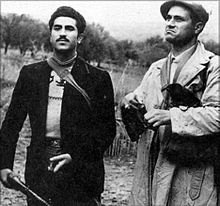The Sicilian
Turi is carried by Aspanu to a local monastery, where he recovers from his wounds and learns more about the criminal side of Sicily under the care of the Abbot Manfredi.
Turi and Aspanu decide to free the prisoners and break into the local police barracks where they are being held.
The freed prisoners include local bandits Passatempo and Terranova, who join Turi's band.
Giuliano begins to become famous throughout Italy after a high-profile robbery, and he becomes a hero in Sicily, as he gives away much of his band's earnings to the poor.
A Socialist parade celebrating recent victories over the Christian Democrats takes place in the towns of Piani dei Greci and San Giuseppe Jato and converge at a plain called the Portella della Ginestra.
Giuliano agreed to suppress the parade, giving his two chiefs, Passatempo and Terranova, orders to "shoot over their heads" to get the crowds to disperse.
He also executes six Mafia chiefs who were defending the estate of Prince Ollorto from land claims by the local peasants.
In retaliation, Giuliano robs a heavily guarded truck that held the money for paying the Carabinieri.
Giuliano's band is falling apart, with Silvestro escaping to England and Andolini and Terranova being killed by police.
With Colonel Luca's forces closing in and Don Croce having betrayed him, Giuliano knows he must leave for America or die in Sicily.
Don Corleone teaches Michael a rather dubious lesson: it is better to remain alive at whatever costs than to be a dead hero.
In 1987, The Sicilian was adapted into a film, directed by Michael Cimino and starring Christopher Lambert as Salvatore Guiliano.
[2] Due to rights issues, all Godfather references were removed and the characters of Michael Corleone and Peter Clemenza were not included in the film adaptation.
